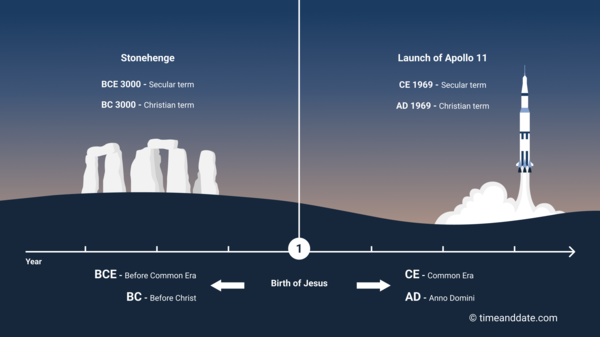Common Era (CE) and Before Common Era (BCE)
Many people use the letters CE and BCE when talking about year numbers. What do they mean, and how do they relate to the traditional AD and BC?

BC and BCE are used for the same time: All years before year 1.
© timeanddate.com
What Is the Meaning of CE and BCE?
The letters CE or BCE in conjunction with a year mean after or before year 1.
- CE is an abbreviation for Common Era. It means the same as AD (Anno Domini) and represents the time from year 1 and onward.
- BCE is short for Before Common Era. It can be used instead of BC (Before Christ) and stands for the time before year 1.
Same as AD and BC
CE and BCE are used in exactly the same way as the traditional abbreviations AD and BC.
Because AD and BC hold religious connotations, many prefer to use the more modern and neutral CE and BCE to indicate if a year is before or after year 1. “Anno Domini” is Latin and translates as in the year of the Lord.
Both systems are acceptable according to the international standard for calendar dates, ISO 8601.
“Common Era” Has Been Used for Centuries
The Anno Domini year-numbering system was introduced by a Christian monk named Dionysius Exiguus in the 6th century. The year count starts with year 1 in the Gregorian calendar. This is supposed to be the birth year of Jesus, although modern historians generally doubt that this is correct.
The expression “Common Era” is also no new invention, however. It has been in use for several hundred years. In English, it is found in writings as early as 1708. In Latin, the term “Vulgaris Aerae” (Vulgar Era) was used interchangeably with “Christian Era” as far back as the 1600s.
More and More Use CE/BCE
What is relatively new is that more and more countries and their educational institutions have officially replaced the traditional abbreviations AD/BC with CE/BCE.
England and Wales introduced the CE/BCE system into the official school curriculum in 2002, and Australia followed in 2011. More and more textbooks in the United States also use CE/BCE, as well as history tests issued by the US College Board.
When to Use CE and BCE
A year listed without letters is always Common Era, starting from year 1.
Adding CE or BCE after a year is only necessary if there is room for misunderstanding—for example, in texts where years both before and after year 1 are mentioned.
For instance, Pompeii, Italy (see image) was founded around 700–600 BCE and was destroyed when Mount Vesuvius erupted in 79 CE.